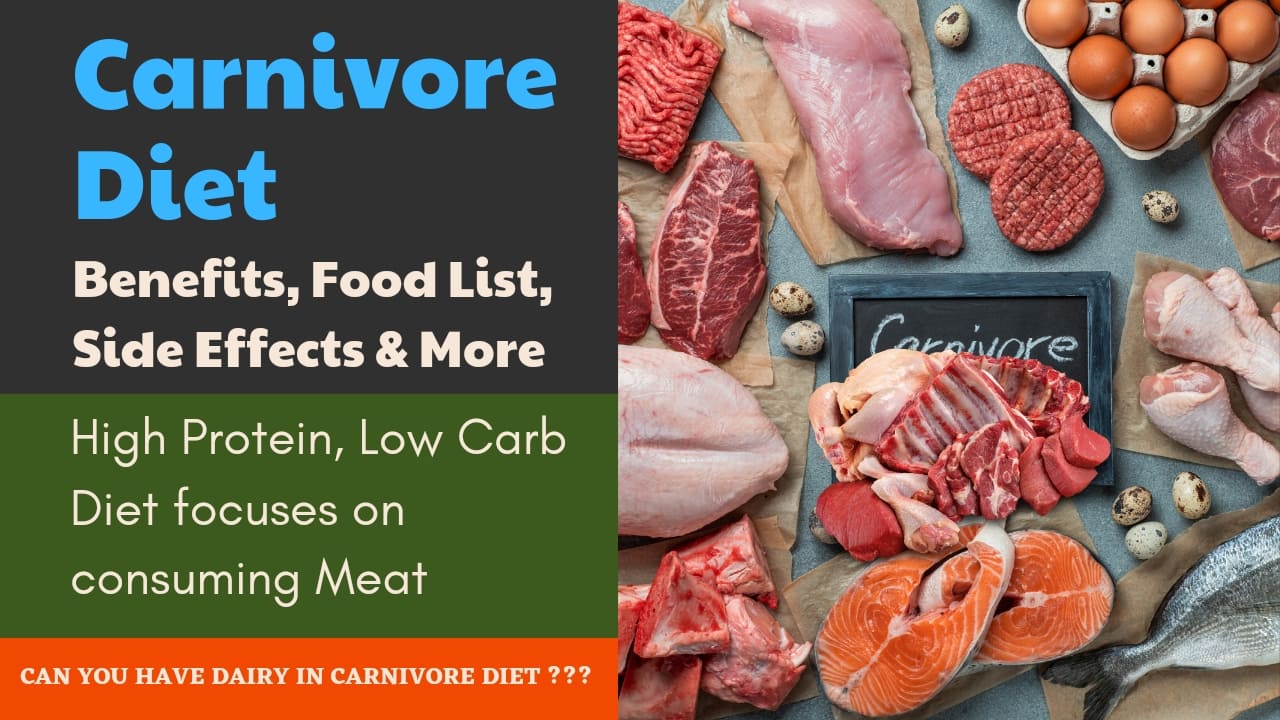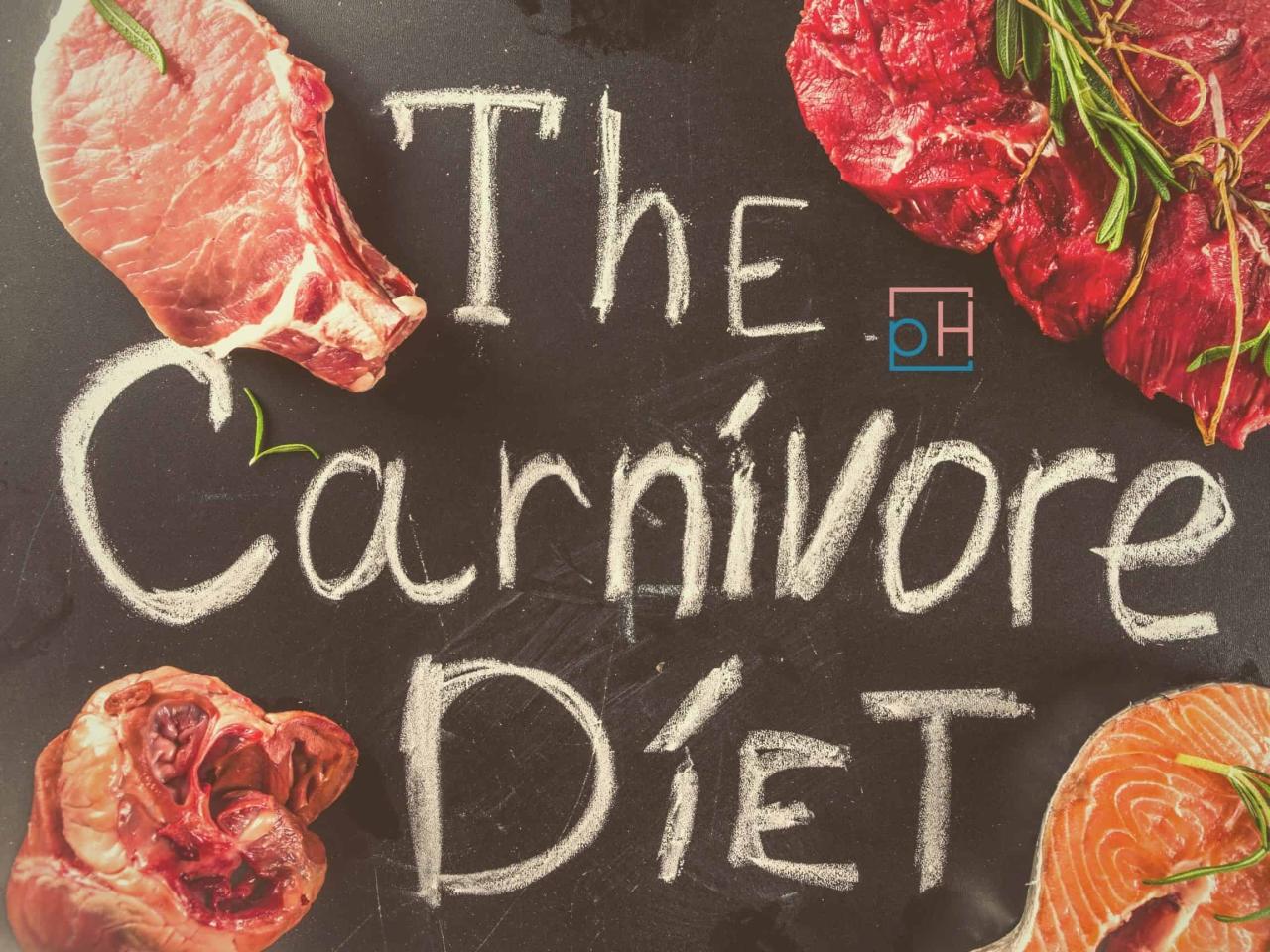Nutritional Considerations
Carnivore Diet: Benefits, Side Effects, and Risks – The carnivore diet drastically limits food intake to animal products, potentially leading to nutrient deficiencies and excesses. Comparing its nutritional profile to other dietary approaches is crucial.
Nutrient Deficiencies
- Fiber:Essential for gut health, absent in the carnivore diet.
- Carbohydrates:Fuel for the brain and body, severely restricted.
- Vitamin C:Antioxidant and immune booster, not found in animal products.
- Calcium:Vital for bone health, limited in the carnivore diet.
- Potassium:Regulates blood pressure, mostly obtained from fruits and vegetables.
Nutrient Excesses
- Saturated Fat:High levels in animal products, linked to cardiovascular disease.
- Protein:Excessive intake can strain the kidneys and contribute to dehydration.
- Cholesterol:Elevated levels in animal products, a risk factor for heart disease.
Strategies for Adequate Nutrient Intake, Carnivore Diet: Benefits, Side Effects, and Risks
- Supplements:Can help address nutrient deficiencies, such as vitamin C, calcium, and potassium.
- Occasional Plant-Based Meals:Introducing plant-based foods periodically can provide essential nutrients.
- Bone Broth:Rich in collagen and minerals, can help supplement calcium and other nutrients.
Ethical and Environmental Implications: Carnivore Diet: Benefits, Side Effects, And Risks

The carnivore diet raises ethical concerns due to its reliance on animal products. Some individuals question the morality of consuming animals for food, arguing that it causes suffering and violates animal rights. Additionally, the environmental impact of meat production is significant, contributing to greenhouse gas emissions, deforestation, and water pollution.
Ethical Concerns
Ethical concerns surrounding the consumption of animal products center around the well-being of animals. Critics argue that factory farming practices, common in meat production, often involve overcrowding, unsanitary conditions, and the use of antibiotics and hormones, which can compromise animal welfare.
The killing of animals for food is also seen by some as an act of violence and unnecessary suffering.
Environmental Impact
Meat production has a substantial environmental footprint. Livestock farming contributes to greenhouse gas emissions through methane production and deforestation for grazing land. Additionally, the industry requires large amounts of water and can lead to water pollution from animal waste and runoff from feed crops.
Sustainable alternatives, such as plant-based diets or regenerative agriculture practices, offer ways to reduce the environmental impact of food production.
Comparison to Other Diets
The carnivore diet differs significantly from other popular diets in terms of food choices, health claims, and potential risks.
The ketogenic diet, for instance, is a high-fat, low-carbohydrate diet that shares some similarities with the carnivore diet. Both diets emphasize the consumption of animal products and restrict carbohydrates. However, the ketogenic diet allows for the inclusion of non-animal foods, such as vegetables and nuts, while the carnivore diet strictly excludes all plant-based foods.
The Mediterranean diet, on the other hand, is a plant-based diet that emphasizes the consumption of fruits, vegetables, whole grains, and healthy fats. It is typically lower in saturated fat and higher in fiber compared to the carnivore diet.
Scientific Evidence
The scientific evidence supporting the carnivore diet is limited. While some studies have shown that the diet can lead to weight loss and improvements in certain health markers, such as blood cholesterol levels, more research is needed to determine its long-term safety and efficacy.
In contrast, the ketogenic diet and the Mediterranean diet have both been extensively studied and have shown consistent health benefits. The ketogenic diet has been shown to be effective for weight loss, reducing seizures in children with epilepsy, and improving blood sugar control in people with type 2 diabetes.
The Mediterranean diet has been linked to a reduced risk of heart disease, stroke, and certain types of cancer.
Personal Experiences and Testimonials

Anecdotal evidence from individuals who have followed the carnivore diet provides insights into its potential benefits and drawbacks. It is important to note that these experiences are subjective and may vary widely depending on individual factors. Consulting with healthcare professionals before making any significant dietary changes is crucial.
Positive Experiences
- Improved digestion and reduced inflammation:Some individuals report experiencing reduced digestive issues, such as bloating, gas, and diarrhea, after adopting the carnivore diet.
- Increased energy and mental clarity:Others have reported feeling more energized and mentally sharp on the diet, attributing it to the high protein and fat content.
- Weight loss and improved body composition:The restrictive nature of the diet can lead to weight loss for some individuals, particularly those with insulin resistance or metabolic disorders.
Negative Experiences
- Nutritional deficiencies:The carnivore diet severely limits plant-based foods, which can lead to deficiencies in vitamins, minerals, and fiber.
- Constipation and other digestive issues:The lack of fiber in the diet can cause constipation and other digestive problems.
- Social isolation:The restrictive nature of the diet can make it challenging to socialize and dine with others who do not follow the same eating pattern.